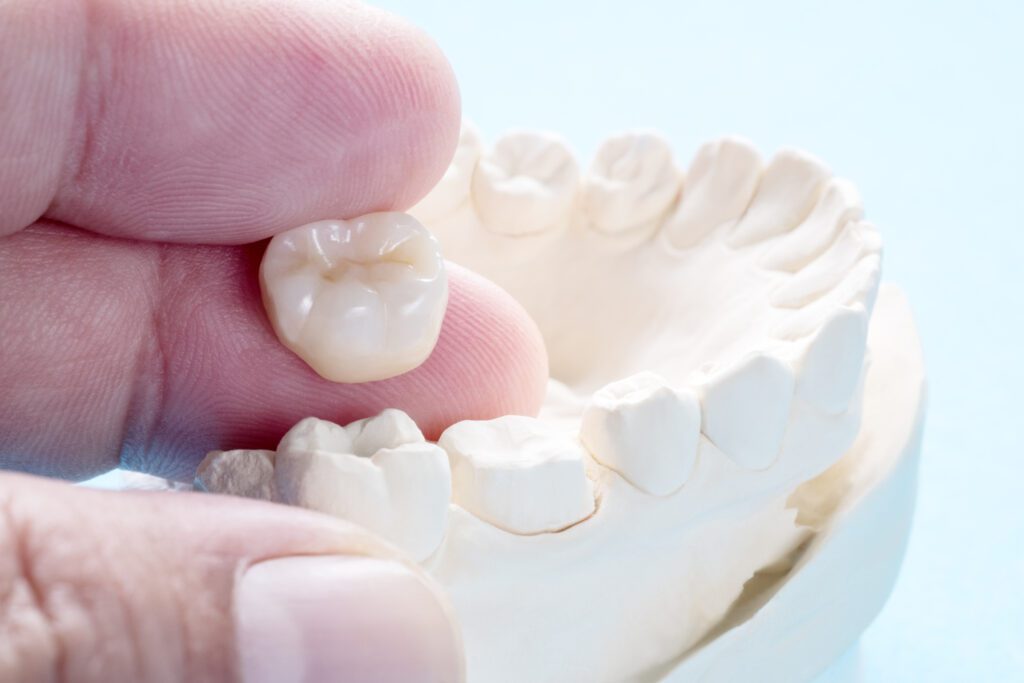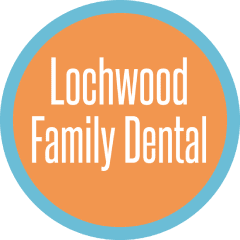Lochwood Family Dental provides dental crowns as a restorative treatment for decayed, damaged, and worn teeth. Tooth crowns are a versatile solution for covering natural teeth or dental implants. A durable and long-lasting restoration, dental crowns can improve the size, color, and function of teeth. Dr. Nguyen provides dental crown treatment in Dallas, TX. She always considers your needs and goals before helping you choose the right solution for your dental problems.
We may recommend a crown after a root canal procedure or when the decay is too large for a simple filling. Dental crowns can also attach bridges, preventing a cracked tooth from worsening. We can also use crowns to enhance or dramatically change a tooth for aesthetic purposes. Dental crown treatment in our Dallas, TX, dental office can create stronger and more aesthetically pleasing smiles.

When Do I Need a Dental Crown?
Dental crowns are adaptable to the needs of each patient and have many uses in dentistry. Tooth crowns can:
- Protect damaged teeth: Patients can restore chipped teeth, broken teeth, and cracked teeth with a dental crown. Crowns protect vulnerable teeth and create a more balanced and sturdy bite.
- Cover a discolored tooth: A porcelain dental crown can cap off a single discolored tooth while blending in with other teeth. We often recommend crowns for patients with discolored and damaged teeth.
- Strengthen a tooth following root canal treatment: A dental crown may require additional support after a root canal. A dental crown not only protects the weakened tooth but also helps to strengthen the bite.
- Cap off dental implants: As the final piece of a dental implant, dental crowns serve as prosthetic teeth. They help patients with single or multiple missing teeth restore the appearance and function of their smiles.
- Secure a dental bridge: A traditional dental bridge consists of false teeth secured by crown-capped teeth. The teeth on either side of a missing tooth gap use support from crowns to keep a bridge in place.
We will help determine if you need a crown based on your needs. If you have a damaged tooth, we will see if you need composite bonding or crowns. Crowns are best for larger areas of damage, including tooth wear and fractures.
Types of Dental Crowns
When you get crowns, you want the right materials to ensure your restoration lasts. There are many types of crowns to choose from:
- Metal Crowns: Metal is the traditional material for dental crowns. Crowns used to use gold or metal alloys for their strength. The downside to metal crowns is they are noticeable in the mouth. Even if metal crowns cover the back molars, people can see them when you open your mouth.
- Porcelain Fused to Metal Crowns: PFM crowns are made of porcelain-covered metal. They are strong and blend in with other natural teeth. However, if you experience gum recession, the metal can show at your gum line, creating an unnatural look.
- Porcelain Crowns: We recommend porcelain crowns because they offer durability and aesthetics. We color-match porcelain dental crowns to your natural teeth for the best results.
- Ceramic Crowns: Same-day crowns usually use ceramic materials. Like porcelain, ceramic matches the color of natural teeth. At the same time, ceramic dental crowns do not last as long as porcelain.
- Zirconia Crowns: These crowns use zirconium dioxide. While these crowns are highly durable, they are often the most expensive option.
The cost of dental crown treatment will depend on the crown material and the number of crowns you need. Our office will work with you to ensure that porcelain crowns meet your needs. We recommend these crowns because they look natural and can last for many years with the right care.
Dental Crown Treatment in Dallas, TX
To begin treatment, we take X-rays and panoramic scans of the teeth. We take these scans to determine where to place your crowns. To prepare teeth for crowns, we will remove a small portion of the tooth enamel for each tooth to accommodate the crown. Then, we take digital impressions and send them to a dental lab.
While the dental lab creates the new crown, we will provide you with a temporary tooth cap. This temporary crown will seal the tooth or teeth receiving the restoration. You will wear the temporary crowns for 2 to 3 weeks until the permanent dental crown is ready.
Once your crown is ready, we will remove the temporary crown and clean the tooth surface. We will check the fit, shape, and color of the crown. Then, we will make any minor adjustments before permanently bonding the crown to the tooth. Finally, we polish the crown for a natural shine.
How to Maintain Dental Crowns
A good-quality crown could last up to eight years or longer with the proper care. Crowns are easy to maintain. You will not need special products to maintain your crown. Instead, you can brush and floss your crown like a natural tooth.
Remember to floss before brushing. Flossing in the crown area is essential to avoid food and bacteria buildup around the restoration. Then, brush with a soft-bristled toothbrush and non-abrasive toothpaste. While crowns are durable, abrasive ingredients can scratch your restoration.
Certain behaviors, such as jaw clenching or bruxism (teeth grinding), significantly shorten the life of a crown. Moreover, eating brittle foods, ice, or hard candy can compromise the crown’s adhesion or even damage the crown. We recommend stopping bad habits like biting nails or chewing on ice before you get crowns.
Additionally, we recommend you continue visiting our office for a routine cleaning and exam. We can clean your crowns and ensure they fit properly.
Get a Strong Dental Crown
Rebuild worn and damaged teeth with a crown. Call Lochwood Family Dental for dental crown treatment in Dallas, TX, at 214-544-9633. You can also schedule a dental appointment with us online anytime. We serve patients from Almeta, Bonite, and Bella Vista, Towngate, and Highland Meadows.
Let us know if you have any questions about dental crown treatment. We’re here to help you find the best restoration for your needs.
